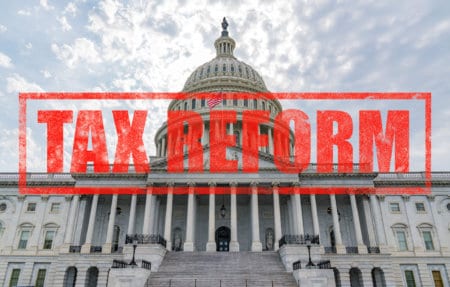Presenting the Tax and Oversight Package: Gavrilov & Co. brings you news this week of the powerful and hard-working legislators of the Ways and Means Committee. Announced on Monday of this week by Chairman Kevin Brady, R-Texas, the Tax, and Oversight Package is ambitious and far-reaching.
He cited the new Tax and Oversight Package as he stated optimistically, “This broad, bipartisan package builds on the economic successes we continue to see throughout our country.” He added, “The policy proposals in this package have the support of Republicans and Democrats in both chambers. I look forward to swift action in the House to send these measures to the Senate.” Before we go into detail about all the proposed legislation in this package, let’s focus on one provision that is very centered on the tax rights of the victims of recent wildfires and other natural disasters.
Tax and Oversight Package: A Mandate for More Temporary Tax Relief for Victims of the Wildfires
2018 has been a quite a year of Natural Disasters. We watched the wildfires of our West Coast friends and citizens with great sadness and empathy. In the Tax and Oversight Package, more temporary tax relief measures are listed for them. As clean-up and rescue measures still continue in Northern California, we are sure the affected taxpayers highly anticipate more tax relief from the legislature.
Current Tax Help

Just in case you did not know the extent of the IRS tax relief measures in such a disaster as the wildfires, let’s take a quick look at the relief measure that the government has already approved:
Under section 7508A of the Tax Code: (it’s a Mighty list, but it’s good to know such relief exists.)
- The IRS gives affected taxpayers until April 30, 2019, to file most tax returns. This includes individual, corporate, and estate and trust income tax returns; partnership returns,
- Likewise, affected tax-payers can wait until April 30, 2019, to file S corporation returns, and trust returns; estate, gift, and generation-skipping transfer tax returns; and employment and certain excise tax returns, annual information returns of tax-exempt organizations; and employment and certain excise tax returns if they are due on or after Nov. 8, 2018, and before April 30, 2019.
Attention, California Fire Victims: Notes from the Tax Code
Although NYC is a long way from California, it pays to be aware of the tax-related laws regarding any disaster. If you have friends or relatives who endured the wildfire disasters on the on the West Coast, they should know:
1. Tax-payers Affected by the Fires will not be subjected to penalties for failure to pay estimated tax installments if they “have an estimated income tax payment originally due on or after Nov. 8, 2018, and before April 30, 2019, as long as such payments are paid on or before April 30, 2019.
2. The IRS also gives affected taxpayers until April 30, 2019, to perform other time-sensitive actions described in Treas. Reg. § 301.7508A-1(c)(1) and Rev. Proc. 2007-56, 2007-34 I.R.B. 388 (Aug. 20, 2007), that were due to be performed on or after Nov. 8, 2018, and before April 30, 2019.
A Very Practical Point on Disaster-Related Filing for the California Wild Fires
Did you know that “any affected taxpayers in a federally declared disaster area have the option of claiming disaster-related casualty losses on their federal income tax return for either the year in which the event occurred or the prior year?”
The IRS has a special page about this. So check out Publication 547 for details, if you are ever involved in a disaster. Moreover, if you are not covered by insurance or other reimbursements, you can deduct personal property losses. Find out more by looking at the linked tax form and its instructions.
One More Tiny Note on the Wildfire Claims: If you were to claim a disaster loss on a 2017 return, you “should put the Disaster Designation, “California, Wildfires” at the top of the form so that the IRS can expedite the processing of the refund.” Use red ink for emphasis.
In addition to the victims of the wildfires, the measures in the new Tax and Oversights Package will provide tax assistance for victims of Hurricane Florence and Hurricane Michael, and the storms and volcanoes in the Pacific.
The Tax and Oversight Package: Boxing up More than Disaster Relief
The Tax and Oversight Package submitted Monday night reminded Gavrilov & Co staff of one of those Holiday packages that contain many more wrapped-up presents in various sizes. In this case, the package included such items as:
1. tax extenders,
2. technical corrections to the Tax Cuts and Jobs Act,
3. retirement and other savings enhancements,
4. And a complete overhaul of the way the Internal Revenue Service operates.
Meet the Tax Extenders

Put simply, tax credits for qualified fuel cell motor vehicles and energy-efficient homes were listed. Interestingly, the package also included tax breaks for racehorses and motorsports entertainment facilities.
In the same package, we found a permanent railroad track maintenance tax credit.
“However, at least one traditional tax extender is being phased out, for biodiesel and renewable diesel.”
A Technical Correction and Depreciation
There are also several time-sensitive technical corrections to the Tax Cuts and Jobs Act. Did you know there was a technical glitch in the depreciation tax break “that discouraged many retail stores and restaurants from making improvements to their property?” This package includes measures to correct that rather egregious error. Your depreciation tax break would be restored.
Something Special for Veterans
The package also clarifies the position of veterans as a specified group for the Low-Income Housing Tax Credit. It also would clarify the treatment of veterans as a specified group for purposes of the Low-Income Housing Tax Credit.
A Nondisclosure Correction
The new bill would remedy a provision in the Tax Cuts and Jobs Act which involves the deduction of sexual harassment settlements by businesses. It should be corrected because it could harm “victims who had signed nondisclosure agreements.”
Some Items for Your Retirement Savings, Employer Plans, and Startup Businesses
One provision in the new package repeals the maximum retirement age of 70 1/2 for traditional IRA contributions. Parents, whether they are young or mature would surely like the provision that would permit them to withdraw up to $7,500 from a retirement account without incurring a penalty if they are about to have a child or adopt one.
Experts explain that “Other provisions involve multiple employer plans and pooled employer plans, as well as a prohibition on qualified employer plans from making loans through credit cards and similar arrangements.”
We know beginning entrepreneurs are sure to like the provision that would allow them to “deduct as much as $20,000 in startup expenses.”
And Now for the Really Big IRS “Box” Inside the Far-Reaching New Tax Package
To put it briefly, the new bill mandates the total overhaul of the IRS. It requires that the IRS would need to submit a plan to Congress for this overhaul by September of 2020. Let’s look at a few highlights:
- The bill would “set up an independent appeals office at the IRS.
- The new legislation would codify the IRS Free File program.
- A new customer experience would be created at the IRS. That is because the bill mandates “a comprehensive customer service strategy at the IRS.”
- Importantly, “It would also provide new requirements before the IRS could seize taxpayer property based on allegations of “structuring transactions” to avoid bank-reporting requirements.”
- Provisions in the bill relate to cybersecurity and identity protection for tax-payers. Plus, the bill includes requirements for the public-private partnership set up by the IRS’s Security Summit and the Information Sharing and Analysis Center. Moreover, it creates guidelines for stolen identity refund fraud cases.
What Will Happen to The “Tax and Oversight” Package Next?
As you might imagine, both Republicans and Democrats support some of the above-suggested laws in the package. Both the IRS reforms and the retirement provisions have bipartisan support. At present, we do not know whether or not the bill will pass in the Senate. There is a strong belief that it might come to a vote in the House this week.

That is one of the reasons Gavrilov & Co utilized this blog to get the word out to you about the far-reaching tax changes it could instigate. The bill is over 300 pages long, and it will entail a lot of work for the lame duck session.
Of course, our experts at Gavrilov & Co, since a political fight is coming. “The ranking Democrat on the Senate Finance Committee, Sen. Ron Wyden, D-Ore., told Politico he hadn’t been consulted on the package before it was introduced by Brady.”
He added that the ways and means committee had not addressed any conversations with Democrats. Then he stated, “to have an extenders package or a technical corrections package, at some point the majority has got to come to the minority and talk about plans…”
We’ll keep you posted as we watch your tax policies develop. Currently, we are sensing some of the same types of emotions that accompanied the birth-pains of the TCJA.

